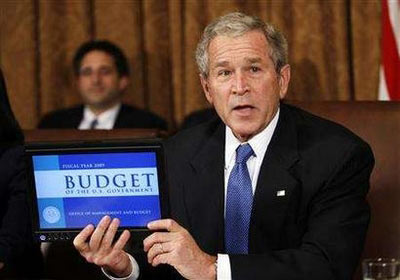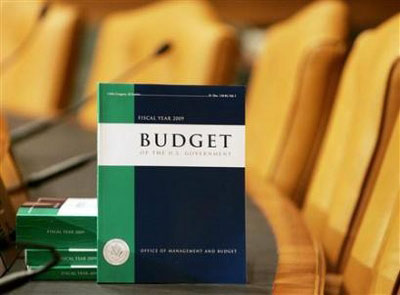President Bush holds up a laptop computer containing the 2009 budget during a meeting with his cabinet at the White House in Washington February 4, 2008. (Xinhua/Reuters Photo)
US President George W. Bush sent Congress a 3.1 trillion budget on Monday for the 2009 fiscal year that approached a landmark in military spending and would widen the government's deficit.
"Two key principles guided the development of my budget – keeping America safe and ensuring our continued prosperity," Bush said in his budget message to Congress, "As commander in chief, my highest priority is the security of the American people."
Under the budget for the fiscal year starting October 1, 2008, military spending is expected to increase by 7.5 percent to 515 billion dollars. Bush also sought 70 billion dollars more for the "global war on terror."
If it is approved full, annual military spending, when adjusted for inflation, will have reached its highest level since World War II.
The 3.1 trillion-dollar budget is 6 percent higher than the projected 2.9 trillion dollar spending in the current fiscal year, which ends on September 30, 2008.
Copies of President Bush's FY 2009 Budget are seen inside the Senate Budget Committee hearing room on Capitol Hill in Washington February 4, 2008. (Xinhua/Reuters Photo)
Meanwhile, Bush wants to renew tax cuts on income, investments and people inheriting large estates – cuts now scheduled to expire at the end of 2010.
The cost of renewing those tax cuts exceeds 300 billion dollars by 2013, according to congressional scorekeepers.
Still, Bush vowed to achieve a surplus in 2012 by restraining government spending.
In the new budget, Bush seeks to eliminate or significantly cut 151 programs, although his proposal to kill or sharply slash 141 programs to save 12 billion dollars was rejected by Congress last year.
The president also seeks 196 billion dollars in savings over the next five years in the government's health care programs – Medicare for the elderly and Medicaid for the poor.
But the bid has little chance on Capitol Hill, analysts believe.
The budget will produce a deficit of 410 billion dollars this year and 407 billion dollars next year, up sharply from last year's 162.8 billion dollars, a five-year low.
Part of the deficit jump for this year and next reflects the cost of a 145 billion stimulus package of tax refunds for individuals and tax cuts for business investment that the House of Representatives has approved and Bush is urging the Senate to pass as soon as possible to prevent the economy from slipping into a recession.
Bush, however, projects that the deficit will decline rapidly starting in 2010 and will achieve a 48 billion dollar surplus in 2012.
The president's forecast was based on flawed math, Democrats said. It only included 70 billion dollars for the wars in Iraq and Afghanistan in 2009 and no money after that.
It also failed to include any provisions after this year for keeping the alternative minimum tax, originally aimed at the wealthy, from ensnaring millions of middle-class taxpayers, they said.
Fixing this tax in 2012 would cost 118 billion dollars, more than double the surplus Bush is projecting for that year, the nonpartisan Congressional Budget Office (CBO) estimates.
US federal deficit set a record of 413 billion dollars in 2004. In his budget sent to Congress in February 2007 for the 2008 fiscal year, Bush projected the government could eliminate the deficit completely and return to a surplus by 2012.
Private economists, however, are predicting a relentless rise in red ink, reflecting the costs of war spending and rising costs for big government benefits programs such as Social Security and Medicare as 78 million baby boomers, who were born between 1946 and 1964, reach retirement age.
The CBO forecast last month that the budget deficit for the 2008 fiscal year will increase to 219 billion dollars, well above last year's five-year low of 162.8 billion dollars.
The US federal budget was in surplus for four years from 1998 through 2001.
(Xinhua News Agency February 5, 2008)



